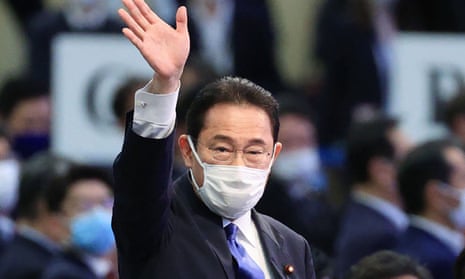Fumio Kishida, a former foreign minister with a reputation as a consensus builder, is set to become Japan’s prime minister after winning the ruling Liberal Democratic party’s presidential election in a runoff against the vaccination minister, Taro Kono.
The LDP-led coalition holds a majority in both chambers of parliament, meaning Kishida is practically assured of the prime ministership at an extraordinary parliamentary session on Monday.
Two female candidates, Sanae Takaichi, a former communications minister, and Seiko Noda, the LDP executive acting secretary general, lost out in the four-way race in the first round of voting earlier on Wednesday.
The contest came down to a two-way battle between Kono and Kishida, who comfortably beat his rival by 257 votes to 170 in a vote among party MPs and representatives of 47 prefectural party organisations.
Kishida, 64, will have little time to adjust to his new role, which became vacant after the outgoing prime minister, Yoshihide Suga, said he would not run in the party leadership race – a decision that effectively ended his premiership.
Kishida now faces a general election that must be held by late November, and must address a potential winter coronavirus outbreak and an economy struggling to emerge from the pandemic.
Speaking after his victory, Kishida called on party members to “show the public that the LDP has been reborn, and appeal for their support.”
He added: “The LDP leadership election is over. Let us all face the lower house and upper house elections as one.
“Our national crisis continues. We need to keeping working hard on the coronavirus response with strong determination, and we need to compile tens of trillions of yen of stimulus package by the end of the year.”
While Suga was assured of victory a year ago thanks to support from major party factions, Wednesday’s contest was harder to predict, partly because most factions had decided not to back a particular candidate and allowed their members a free vote.
Kono, a US-educated former defence and foreign minister whom some regard as an antidote to Japan’s staid political culture, faced off against Kishida, who has a reputation for being an effective, if uninspiring, consensus builder, after neither man won a majority of votes in the first round of voting.
With a general election looming, the LDP is looking to its new leader to appeal to the country’s voters after a year of Suga, whose support plummeted over his handling of the coronavirus and his insistence on hosting the Tokyo Olympics during the pandemic in defiance of public opinion.
Suga’s low approval ratings were also attributed to the continuing influence of his predecessor, Shinzo Abe, who has been blamed for establishing a high-handed style of leadership, discouraging internal debate and dragging the LDP to the right.
Wednesday’s vote was a test of whether the party was prepared to move out of Abe’s shadow, said Yu Uchiyama, a political science professor at the University of Tokyo.
“What’s at stake is the state of democracy in Japan, and if or how the new leader is willing to listen to the people’s voices and take them into political consideration,” Uchiyama said. “Prime minister Suga obviously had a problem with communicating with the people and did not provide accountability.”
Kishida, however, is unlikely to trigger a huge shift in policies as Japan seeks to cope with an assertive China and revive an economy hit by the pandemic. Kono’s push for renewable energy and to remove bureaucratic obstacles to reform had appealed to investors and business chiefs, but party traditionalists were reportedly wary of his unpredictable nature, despite his popularity with the public.
During his leadership campaign, Kishida pointed to the failure of Abe’s signature “Abenomics” mix of expansionary fiscal and monetary policies and growth strategy to benefit households, but has so far offered few specifics on his own vision for the economy.
The LDP leadership candidates also clashed over cultural values, with Kono favouring legal changes to allow same-sex marriage and separate surnames for married couples. Kishida, however, said he had “not yet reached the point” where he could back gay marriage.
